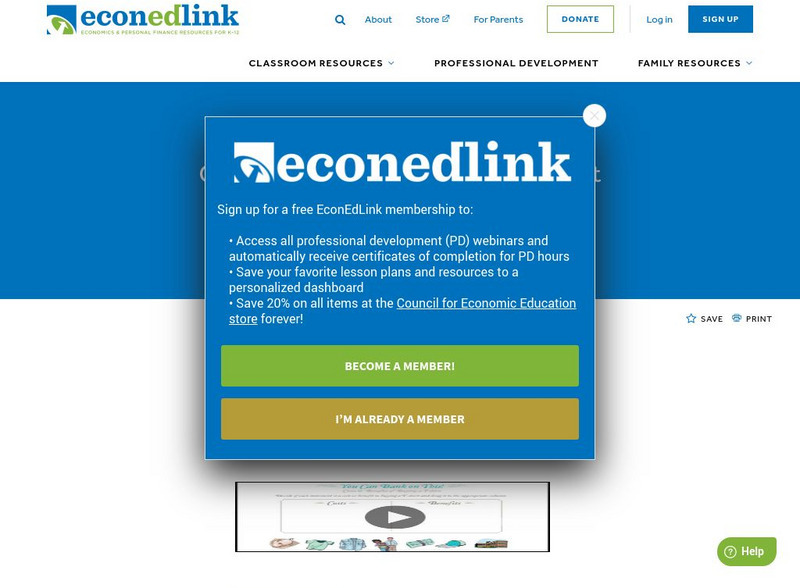Hi, what do you want to do?
Curated OER
Pollution Prevention At Ft. Riley
Student examine methods of pollution reduction used at Ft. Riley military institution. Students review the economic impact of the use of enviromentally sensitive materials.
Curated OER
Spraying Strawberries
Learners decide how many times to spray a strawberry crop. They apply marginal analysis and discover the "law of diminishing returns."
Curated OER
How Can Business Profit from Tariffs? p1
Students investigate the impact of tariffs on businesses and consumers during the 1880s by looking at a political cartoon, solving a short math problem and comparing protectionism in the 1980's to protectionism in the 1880's.
Curated OER
Is Capitalism Good for the Poor? | How Incentives Affect Innovation
Pupils focus on the role played by a nation's institutions in generating creativity, invention and innovation, and analyzes how innovation promotes the economic growth that raises standards of living and alleviates poverty.
Curated OER
The Power of Compounding
Sixth graders examine the concept of compounding interest on invested money. They explore how much interest their money would earn through compounded interest. Students conclude that they should invest early and often.
Curated OER
Can Land Ethics Work?
Young scholars evaluate the various purposes and issues surrounding the management of a nature preserve. They participate in discussion on whether there is intrinsic value in nature for its own sake.
Curated OER
Child Labor in Maryland: An Historical Investigation
Tenth graders, after reading two excerpts about contemporary child labor situations, discuss two broad questions in detail along with the industrial boom following the Civil War conditions in the United States. They investigate how the...
Curated OER
How did Geography Affect the Economy of the Colonies
Eighth graders examine the impact of geography on a region. In this geography activity, 8th graders study the themes of geography. Students write an open response to a question.
Curated OER
Game Theory
Students examine the history of the game theory. They practice using new vocabulary. They write about the debate on exchange using different viewpoints.
Curated OER
Transportation Fuels Debate
Students study the different transportation fuels. In this energy sources lesson students debate the merits of their fuel over others while working together in groups.
Curated OER
Lesson 3: Making a Living
Students, in groups, create hypothetical financial plans for a colonial Maine family living on the frontier.
Curated OER
Chernobyl
High schoolers list some of the health effects of radiation exposure. They are engaged in a unit on nuclear power by demonstrating the potential environmental health risks involved.
Curated OER
What is the Problem of Boston Harbor?
Students recognize the affects of technology on the environment. They examine data to determine methods to improve waater quality. A research paper is written to desribe recommendations for improving water in the future.
Curated OER
The IMF in Action: Who is the IMF?
Students use the internet to examine IMF member countries. They work together in groups to read information about the different IMF representatives. They discuss what they have read.
Curated OER
How to be the Host with the Most
Students discover details about the Olympic bidding process. In this current events lesson, students research the listed Web sites that include information about London's bid for the 2012 Olympic Games.
Curated OER
Urban Renewal
Eleventh graders write down their best guess at the meaning of "urban renewal." students stage a Mayor's press conference announcing a new urban development plan for the Fillmore.
Council for Economic Education
Econ Ed Link: Costs and Benefits of Buying a T Shirt
Video and related resources examines the costs and benefits of buying a new T-shirt.
Council for Economic Education
Econ Ed Link: Costs and Benefits of 'The Three Little Pigs'
Find out what the definition of a cost and a benefit is in terms of the economy when using this site. "When making a decision, students should consider the costs and the benefits of that decision."
Khan Academy
Khan Academy: The Tradeoff Between Economic Output and Environmental Protection
Unfortunately, it's not possible for a country to maximize both its environmental protection and its economic output. Each country must make a decision about how the two goals should be balanced and how to achieve that balance.
Other
Foundation for Teaching Economics: Lesson 2: Opportunity Cost and Incentives
This instructional activity covers the National Content Standard 2: Marginal Decision Making. It provides key terms and concepts around scarcity forces, changing opportunity costs which affect incentives and choices. It includes links to...
Other
Michigan Department of Agriculture: Risks vs Benefits in Food Production [Pdf]
Michigan Department of Agriculture provides this site that teaches students about the risks and benefits involved with food production. Includes a detailed lesson plan along with a list of terms and definitions. Gives great background...
Council for Economic Education
Econ Ed Link: The Economics of Homebuying
This lesson analyzes the costs and benefits of homeownership and asks the student to describe the factors that affect affordability, use cost-benefit analysis and knowledge of home-buying procedures to reduce the costs, analyze the...
Council for Economic Education
Econ Ed Link: Country Mouse Makes a Decision! (Student Version)
Use this site to teach your primary students how to identify the costs and benefits of making a decision. Animated link to the story, Country Mouse Makes a Decision, makes this an entertaining and educational economics lesson.
Council for Economic Education
Econ Ed Link: The Economics of Voting: What Do You Mean My Vote Doesn't Count?
This lesson explores the costs and benefits associated with voting in national elections. Specifically, the concepts of rational apathy, rational ignorance and expressive voting are explained.

























